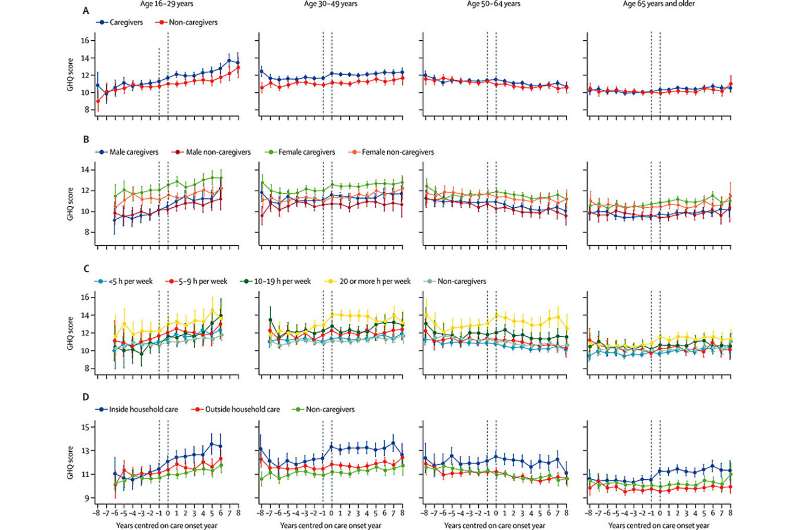This article has been reviewed according to Science X's editorial process and policies. Editors have highlighted the following attributes while ensuring the content's credibility:
fact-checked
trusted source
proofread
Mental health declines when becoming an unpaid caregiver, UK study finds

The mental health of people comes at a cost when they take on unpaid caring roles for friends and family. That's according to research from St George's, University of London and UCL which is published today in The Lancet Public Health.
Becoming a caregiver was linked to increased psychological distress for caregivers of every age in the study, including those aged 16–49. Mental health function also declined when becoming a caregiver in those aged 30–64.
The researchers say this mental health change in caregivers across the U.K. should spearhead national changes to the way they are supported to avoid a decline in their own health and well-being, not forgetting younger caregivers.
This evidence coincides with publication of a landmark APPG report on young and young adult caregivers which reveals the vast numbers of younger caregivers who are not identified early enough, with an average waiting time of three years until young caregivers get linked to any support.
As the U.K. population ages and the cost-of-living rises, unpaid care of family and friends has become an increasingly important part of care in most countries. The United Nations estimate that unpaid caregivers meet 75%–90% of care needs, and although young adults are often overlooked, they make up at least 376,000 of the caregivers across the U.K.
Calling for better support
Previous research has found that the general health of unpaid caregivers is poorer than non-caregivers. But until now, there has been little research into how people's mental health changes when they start being a caregiver, and whether this varies by age, gender and the amount of care they provide.
"Younger caregivers are often overlooked as caring is seen as something that older adults do. We urge health leaders to take this evidence seriously and ensure that health practitioners quickly identify caregivers of their patients, including those who are younger adults, so their health can also be reviewed. This is going to be crucial to break the cycle of care need," says Dr. Rebecca Lacey, lead author and reader in social and lifecourse epidemiology at St George's Population Health Research Institute.
Researchers used data from more than 17,000 people in the UK Household Longitudinal Study between 2009 and 2020 to investigate mental and physical health changes around the transition to becoming a caregiver for the first time in adults as young as 16 years of age.
Data was collected on 16,906 people from the General Health Questionnaire (GHQ-12) which measures psychological distress and on 17,909 people from the 12-item Short Form Survey (SF-12) which measures physical and mental functioning. The team looked at the mental and physical health of caregivers eight years before, during, and eight years after becoming a caregiver, comparing them with non-caregivers who were otherwise similar.
They looked at four different life stages—early adulthood (16–29 years), early mid-adulthood (30–49 years), later mid-adulthood (50–64 years), and later life (65+ years). There were more women than men who became caregivers in every age group, but the effect of becoming a caregiver on health did not differ for men and women.
Compared to non-caregivers, caregivers aged 16–29, 30–49 and 50–64 years had the largest increase in psychological distress when becoming a caregiver with a 0.37, 0.39 and 0.39 point increase in GHQ score, respectively. Caregivers aged 30–49 and 50–64 had the largest decrease in mental health function, with a 0.54 and 0.46 point reduction in the SF-12 score, respectively.
Action is needed
Although these are modest changes, researchers say they unequivocally warrant the need for action to protect the declining mental health of people when becoming caregivers.
The team also found that people who provided a high intensity of care (20 or more hours per week) experienced increased psychological stress and decline in mental health. In caregivers 30 years of age and above, poorer mental health persisted for several years after becoming a caregiver so early identification is key to preventing long-term mental health effects.
Physical health did not change upon becoming a caregiver, but there was evidence of poorer physical health prior to caregiving compared to non-caregivers.
"It's less common for people to become a caregiver in early adulthood when there are likely to be many competing social roles such as post-secondary education and relationships, as well as establishing a career. Early and mid-adult caregivers were likely to be caring for a parent, representing a challenging role reversal. Together these factors could contribute to why psychological distress was higher in these age groups," says Professor Anne McMunn, professor of social epidemiology at UCL.
Rohati Chapman, Caregivers Trust's executive director for programs, policy & impact, said, "Caregivers Trust welcomes this much-needed research showing that unpaid caregivers are at risk of poorer mental health and well-being. Unpaid caregivers are making huge sacrifices to look after family members and friends. It is vital their health and well-being should not suffer as a result.
"They must have access to effective mental health provision in their area and to dedicated caregiver support when and where they need it. Our network of local caregiver organizations are ready to help with this but it is clear that support must be ramped up across the board."
More information: Rebecca E Lacey et al, Mental and physical health changes around transitions into unpaid caregiving in the UK: a longitudinal, propensity score analysis, The Lancet Public Health (2023). DOI: 10.1016/S2468-2667(23)00206-2

















